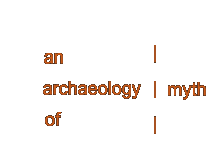
In what way is a lawyer's work and life mythic? What do lawyers by way of work and life know of myth? What myth(s) shape our work and our lives as lawyers?
 |
In what way is a lawyer's work and life mythic? What do lawyers by way of work and life know of myth? What myth(s) shape our work and our lives as lawyers? |
|
And how are we taught, in everyday life to regard myth? As illusion, distortion, misrepresentation, the absence of rationality, a view of the world denied by science? We may, because of the times in which we live, have more questions than answers about mythology and the relation of myth to lawyering. Given present cultural misunderstandings about myth, we might be tempted to begin by defining myth. But one need not address every misunderstanding by way of definitions. William E. Kennick, a philosophy professor at Amherst, tells those who ask for definitions in their first efforts to talk about philosophy: "it is generally best to lie down until the feeling passes." [William E. Kennick, "Teaching Philosophy," in Teaching What We Do: Essays By Amherst College Faculty 163-181, at 165 (Amherst, Massachusetts: Amherst College Press, 1991)]. The quick relief and reassurance made possible by a definition cuts against the grain of myth, putting myth in a settled place, as if it too could be assigned a categorical space in the everyday world we inhabit. Myth directs us to realms of human existence that lie just beyond the named, the obvious, the literal, and the carefully defined. And yes, we need all the definition and clarity about myth we can get. Whether by definition or by other means, "[w]e need words in law to learn the sins as well as the glories of the past, to give voice to current conflicts, and to retell and recreate our own myths." [Aviam Soifer, Reviewing Legal Fictions, 20 Geo. L. Rev. 871, 873 (1986)] We are likely to have some big questions about myth, and it would be foolish to try to give simple answers. Our questions about myth open up many ways to proceed and it is difficult to know exactly where we might best begin. One problem with talking about myth is that we realize we are entering a vast realm of knowledge, like a darkened cave that turns out to be an underground cavern. Myth holds itself out to us with such enormity that our efforts to offer definitions and declarative, propositional statements turn problematic. What kind of education in myth have we had? By education, we first
take account of formal schooling. But we have all already received many
kinds of education when we take part in formal schooling: family education; education
that goes with the place we are born, or our parents or grandparents were
born, the place or places where we were raised, and the places where our
schooling took place; education of the culture(s) in which we were born
and raised, or the cultures we have joined or that have joined us. |